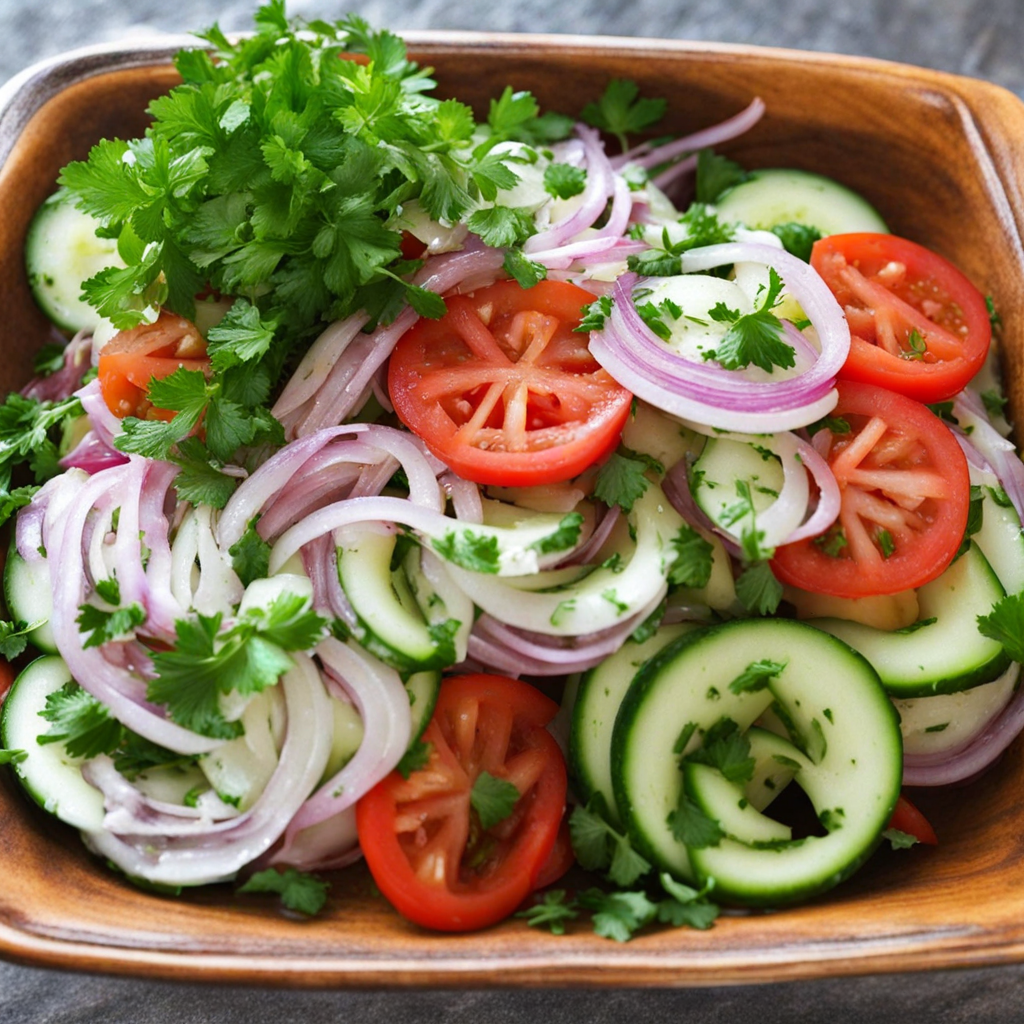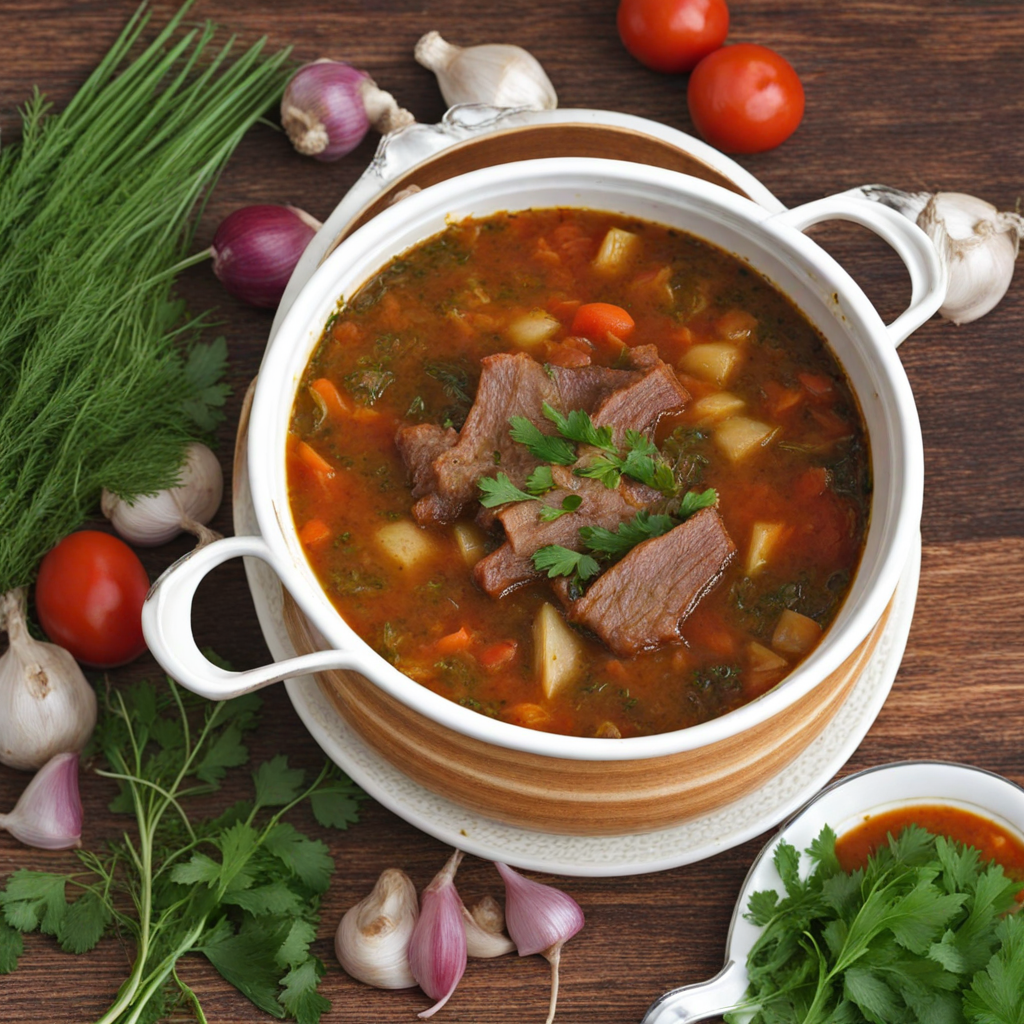Choban Salad
Choban Salad, also known as Shepherd's Salad, is a refreshing and vibrant dish that epitomizes the flavors of Azerbaijani cuisine. This salad is a colorful medley of fresh vegetables, primarily featuring ripe tomatoes, crisp cucumbers, and aromatic bell peppers, each chopped into bite-sized pieces. The combination of these ingredients creates a delightful crunch, while their natural sweetness and juiciness offer a perfect balance to the dish. The freshness of the vegetables is further enhanced by the addition of finely chopped onions and fragrant herbs, such as parsley and cilantro, which infuse the salad with an irresistible aroma and depth of flavor. What sets Choban Salad apart is the simplicity of its preparation, allowing the natural tastes of the ingredients to shine through. A generous drizzle of olive oil adds a rich, smooth texture, while a sprinkle of salt and a dash of vinegar provide a tangy contrast that brightens the entire dish. Some variations may include a squeeze of fresh lemon juice for an extra zesty kick or a pinch of red pepper flakes for those who enjoy a hint of heat. This salad is not only visually appealing but also a wholesome, nutritious choice that can be enjoyed as a side or a light main course. Choban Salad embodies the essence of Azerbaijani hospitality, often served at gatherings and special occasions. Its vibrant colors and fresh flavors make it a delightful addition to any meal, complementing grilled meats, pilafs, or even enjoyed on its own. With each bite, you can experience the harmony of textures and tastes that celebrate the bountiful produce of the region, making Choban Salad a must-try for anyone looking to explore new culinary horizons.
How It Became This Dish
The History of چوبان سالاد (Choban Salad) from Azerbaijan #### Origins Choban Salad, or "Shepherd's Salad," is a quintessential dish in Azerbaijani cuisine that reflects the country's rich agricultural heritage and the pastoral traditions of its people. The origins of Choban Salad can be traced back to the rural landscapes of Azerbaijan, where shepherds and farmers relied on simple, fresh ingredients to create nourishing meals. The name "Choban" translates to "shepherd" in Azerbaijani, which hints at its pastoral roots. The salad typically consists of a vibrant mix of chopped tomatoes, cucumbers, onions, bell peppers, and fresh herbs, often garnished with a drizzle of olive oil and a splash of vinegar or lemon juice. The ingredients are largely sourced from local gardens, reflecting the seasonal availability of fresh produce, and it embodies the principles of eating locally and sustainably. #### Cultural Significance Choban Salad holds a special place in Azerbaijani culture, serving not just as a dish, but as a symbol of hospitality and community. In a country where social gatherings often revolve around feasting, Choban Salad is a staple on the table during family gatherings, weddings, and other celebrations. It represents the connection to the land and the agricultural lifestyle that many Azerbaijanis have historically embraced. The salad is also significant for its role in the traditional Azerbaijani meal structure, which often emphasizes a balance of flavors and textures. It is typically served as a mezze, a small dish meant to be shared, highlighting the communal aspect of dining that is so integral to Azerbaijani culture. The use of fresh ingredients reflects a philosophy of health and wellness that permeates Azerbaijani cuisine, with a strong emphasis on natural and unprocessed foods. #### Development Over Time As Azerbaijan's culinary traditions evolved, so too did Choban Salad. While it has deep roots in the pastoral lifestyle, the salad has adapted to modern culinary practices and the changing tastes of society. With the rise of urbanization in Azerbaijan, particularly in cities like Baku, the accessibility of diverse ingredients has influenced the preparation and presentation of Choban Salad. In the early 20th century, during the Soviet era, the introduction of canned and processed foods began to impact traditional recipes. However, Choban Salad remained a popular choice among families who sought to maintain their culinary heritage. The salad's emphasis on fresh vegetables ensured its survival as a staple dish, even amid the changing food landscape. With Azerbaijan's independence in the early 1990s, there was a resurgence of interest in traditional cuisine. Chefs and home cooks alike began to celebrate and preserve their culinary roots, leading to a renewed appreciation for dishes like Choban Salad. This revival was not merely about nostalgia; it also aligned with a global trend toward health consciousness and the farm-to-table movement, which emphasizes the importance of fresh, minimally processed ingredients. Today, Choban Salad is enjoyed not only in Azerbaijani households but also in restaurants and cafes across the country and beyond. Its simplicity and flavor profile make it a popular choice for those seeking healthy, vegetarian-friendly options. The salad has also found its way onto international menus, showcasing the richness of Azerbaijani cuisine to a broader audience. #### Ingredients and Variations While the classic Choban Salad generally adheres to a specific set of ingredients, there are numerous regional and personal variations. In some cases, additional ingredients such as radishes, parsley, or even pomegranate seeds might be included, each variation adding its unique twist to the dish. The use of different types of vinegar or oils can also create variations in flavor, making Choban Salad a versatile dish that can be tailored to individual tastes. In regions with a strong Persian influence, for instance, you might find Choban Salad doused in a tangy sumac seasoning, which adds a distinctive tartness that complements the fresh vegetables beautifully. In coastal areas, seafood might be introduced, creating a fusion of flavors that speaks to the region's culinary diversity. #### Choban Salad in Modern Times In contemporary Azerbaijan, Choban Salad has transcended its humble origins and is now a beloved dish that embodies the spirit of Azerbaijani cuisine. It is often featured in cookbooks and culinary events, highlighting its importance in the national food narrative. Many chefs take pride in their own interpretations of Choban Salad, showcasing their creativity while respecting the traditional roots of the dish. Moreover, as global interest in Azerbaijani cuisine grows, Choban Salad has become a culinary ambassador for the country. Food enthusiasts and travelers often seek out authentic versions of the salad during their visits, eager to experience the flavors of Azerbaijan firsthand. This increasing visibility has helped to solidify Choban Salad's status as an essential component of Azerbaijani culinary identity. #### Conclusion Choban Salad is more than just a dish; it is a celebration of Azerbaijan's agricultural heritage, a symbol of hospitality, and a testament to the resilience of traditional culinary practices. Its evolution from a simple shepherd's meal to a celebrated dish in contemporary cuisine illustrates the adaptability and enduring appeal of Azerbaijani food culture. As Azerbaijan continues to embrace its culinary roots while engaging with global trends, Choban Salad will undoubtedly remain a cherished part of its gastronomic landscape, inviting people to share in its fresh flavors and rich history.
You may like
Discover local flavors from Azerbaijan







